Top 10 Golf Rangefinders of 2025: Best Picks Ranked

This post contains affiliate links. If you purchase a rangefinder through these links, we may earn a small commission at no extra cost to you. This helps support our blog and keeps us bringing you the latest golf gear insights. Thanks for your support!
Looking to up your golf game in 2025? A top-notch rangefinder can be your secret weapon, delivering precise distances and game-changing insights.
In this post, we’ve ranked the 10 best golf rangefinders—from the tech-packed Bushnell Pro X3+ to the budget-friendly TecTecTec KLYR—based on accuracy, features, and value.
There’s a rangefinder for every game and budget, here’s your guide to finding the perfect rangefinder, with clear reasons why each made the cut.
Let’s dive in!
Best Golf Rangefinders 2025:
Below is a table summarizing the top 10 rangefinders, their key specifications, and reasons for making the list, based on our research:
| Rank | Model | Price | Range (yards) | Magnification | Key Features | Reasons for Choice |
|---|---|---|---|---|---|---|
| 1 | Bushnell Pro X3+ | $599.99 | 1,300 | 7x | Wind speed, temperature, barometric pressure, slope | Advanced features, high accuracy, ideal for tech-savvy golfers |
| 2 | Bushnell Tour V6 Shift | $399.99 | 1,300 | 6x | Exceptional optics, vibration target lock, BITE magnet | Best optics, easy to use, highly accurate for most golfers |
| 3 | Voice Caddie SL3 | $599.99 | 1,000 | 6x | Touchscreen, green undulation, course layout, putt view, elevation, distance | Hybrid GPS/laser, comprehensive features, best for detailed course analysis |
| 4 | Garmin Approach Z82 | $489.99 | 450 | 6x | Full hole maps, wind speed, PinPointer, Green Contour, tournament mode | Unique maps, environmental adjustments, packed with features |
| 5 | Shot Scope PRO ZR | $299.99 | 1,500 | 6x | Target-lock vibration, adaptive slope, free GPS maps | Great value, extensive range, performance tracking capabilities |
| 6 | Nikon Coolshot Pro II | $449.95 | 1,200 | 6x | Stabilized, bright OLED display, slope-adjusted yardage, fast measurements | Stabilized for shaky hands, clear optics, fast and accurate |
| 7 | Blue Tees Series 3 Max | $269.98 | 900 | 7x | Slope-adjusted, magnetic cart mount, water-resistant, attractive design | Stylish, functional, good for golfers valuing design and portability |
| 8 | Precision Pro R1 Smart | $319.99 | 1,200 | 7x | App integration, plays-like distance, wind speed/direction | Smart features, enhances decision-making with app data |
| 9 | GolfBuddy Aim Quantum | $276.90 | 880 | 7x | Compact, lightweight, ZST+ technology, leather magnetic case | Best for portability, fast measurements, convenient case |
| 10 | TecTecTec KLYR | $199.99 | 800 | 6x | Vibrant display, compact, lightweight, tremendous value | Budget-friendly, magnetic features, good for basic needs |
#1 – Bushnell Pro X3+
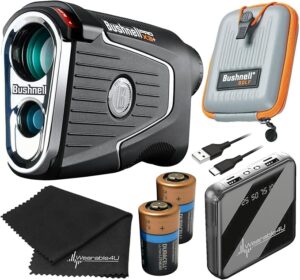
🏆 Best Overall Rangefinder For Golf
Known for advanced features like wind speed, temperature, and barometric pressure, offering high accuracy with 7x magnification and a 1,300-yard range. It’s ideal for golfers seeking cutting-edge technology.
Retail Price: $599.99
#2 – Bushnell Tour V6 Shift
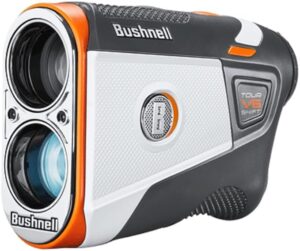
Stands out for exceptional optics and ease of use, with highly accurate distance measurements, making it a top choice for most golfers.
Retail Price: $399.99
#3 – Voice Caddie SL3
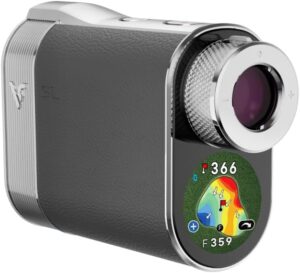
A hybrid GPS and laser rangefinder with a touchscreen, providing comprehensive course information like green undulation and putt view, perfect for detailed analysis.
Retail Price: $599.99
#4 – Garmin Approach Z82
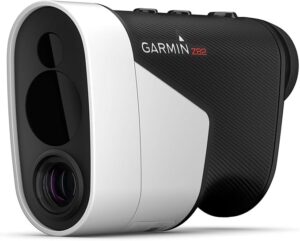
Features unique full hole maps and environmental factor adjustments, packed with features for precision play, especially useful in varied conditions.
Retail Price: $489.99
#5 – Shot Scope PRO ZR
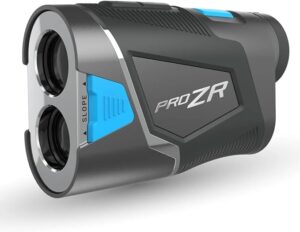
Offers target-lock vibration, a 1,500-yard range, and adaptive slope technology, plus free GPS maps, making it a great value for performance tracking.
Retail Price: $299.99
#6 – Nikon Coolshot Pro II
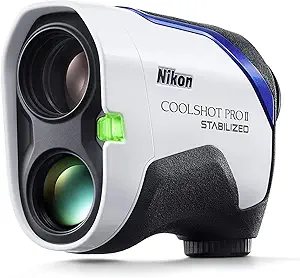
Stabilized for shaky hands, with a bright OLED display and fast, accurate slope-adjusted yardage, ideal for clear optics in any light.
Retail Price: $449.95
#7 – Blue Tees Series 3 Max
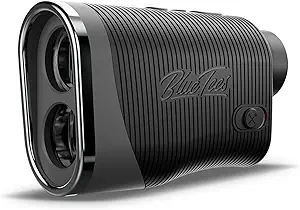
Noted for slope-adjusted yardages, a magnetic cart mount, and a 900-yard range, plus water-resistance and attractive design, appealing to style-conscious golfers.
Retail Price: $269.98
#8 – Precision Pro R1 Smart
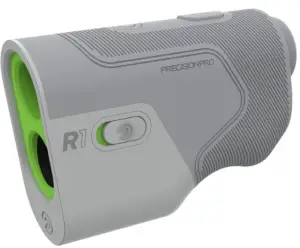
Pairs with an app for advanced info, including plays-like distance and wind speed/direction, enhancing smart play decisions.
Retail Price: $319.99
#9 – GolfBuddy Aim Quantum
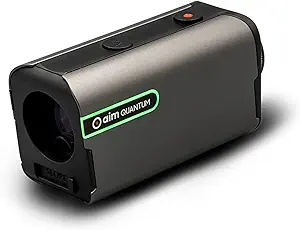
Compact and lightweight with fast measurement technology and a leather magnetic case, perfect for golfers prioritizing portability.
Retail Price: $276.90
#10 – TecTecTec KLYR
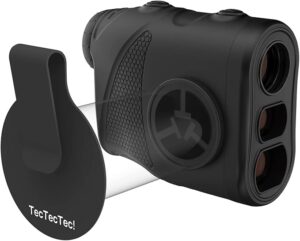
Offers a vibrant display, compact build, and tremendous value, suitable for budget-conscious golfers needing basic magnetic features.
Retail Price: $199.99
Why Use a Golf Rangefinder?
A golf rangefinder is a game-changer for players of all levels, delivering pinpoint accuracy that eliminates guesswork.
With precise distances to the pin, hazards, or any target, you can confidently choose the right club and strategy for every shot.
Rangefinders shine on challenging courses, helping you adjust for slopes, wind, or elevation with ease.
Beyond precision, they boost confidence, letting you focus on your swing rather than second-guessing yardages.
Whether you’re a beginner aiming to improve or just chasing lower scores, a rangefinder can shave strokes off your game by turning unknowns into certainties.
It’s like having a caddie in your pocket—minus the small talk!
How We Ranked These Rangefinders
To bring you the top 10 golf rangefinders of 2025, we dug into trusted sources from golf pros, top golf influences, personal experience, and consumer feedback.
Our rankings hinge on key criteria: accuracy (within +/- 1 yard), range (from 300 to 1,500 yards), and standout features like slope adjustment, hybrid GPS, or environmental data.
We also weighed usability—think clear optics, stabilization, and battery life—alongside value for money, ensuring options fit both premium and budget needs.
Golf tech expert recommendations guided us, with models like the Bushnell Pro X3+ topping lists for tech, while the TecTecTec KLYR earned nods for affordability.
We balanced cutting-edge innovation with practical performance, crafting a list that’s credible, transparent, and tailored to golfers seeking the best tools for their game.
Key Features to Look For
Choosing the right golf rangefinder means focusing on features that match your game. Here’s what to prioritize:
- Accuracy: Look for models delivering within +/- 1 yard. Precise distances to pins or hazards ensure reliable club choices, boosting your confidence on every shot.
- Slope Technology: Essential for hilly courses, this adjusts yardages for elevation changes. Opt for toggleable slope (e.g., Bushnell Tour V6 Shift) to stay tournament-legal when needed.
- Range: Ranges vary from 300 to 1,500 yards. Casual players might need 800 yards (TecTecTec KLYR), while long hitters benefit from 1,300+ (Bushnell Pro X3+).
- Magnification: 6x to 7x is standard, offering clear views of distant targets. Higher magnification (e.g., 7x on Blue Tees Series 3 Max) suits detailed scanning.
- Waterproofing: Rain happens. IPX4+ ratings (like Garmin Approach Z82) protect against splashes, keeping your device functional in wet conditions.
- Display Quality: Bright, readable screens (e.g., Nikon Coolshot Pro II’s OLED) matter in sunlight or shade for quick glances.
- Battery Life: CR2 batteries last 6-12 months, while rechargeables (e.g., GolfBuddy Aim Quantum) offer convenience. Check runtime—up to 15 hours for some.
- Extras: Vibration lock (Shot Scope PRO ZR) confirms targets, and magnetic mounts (Blue Tees) add practicality.
These features determine performance and fit. Match them to your budget and playing style for a rangefinder that elevates your game.
🏆 Our Recommendation
From the tech-packed Bushnell Pro X3+ to the budget-savvy TecTecTec KLYR, our top 10 golf rangefinders of 2025 offer a little something for every golfer.
Whether you prefer advanced features or simple reliability, any of these picks will help you dial in your yardages.
Our Top Pick:

The Bushnell Pro X3+ stands out for its all-around excellence.
Frequently Asked Questions (FAQ)
Got questions about golf rangefinders? Here are quick answers to the most common ones:
Yes, distance-measuring devices are allowed in most amateur competitions if slope features are disabled (e.g., Bushnell Tour V6 Shift’s toggleable slope). Check local rules, as pro tours like the PGA often ban them.
Most use CR2 batteries, lasting 6-12 months with regular play. Rechargeable models (e.g., GolfBuddy Aim Quantum) offer 10-15 hours per charge—perfect for a full day.
It’s great for practice on hilly courses, adjusting yardages for elevation, but must be off for tournament play.
Absolutely—precise distances improve club selection and confidence, especially for mid-to-high handicappers.
Varies from 300 yards (Precision Pro R1) to 1,500 yards (Shot Scope PRO ZR), depending on the model and conditions.
Have more questions? Drop them in the comments below!






